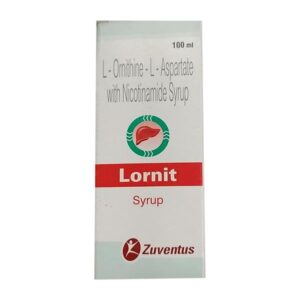VIT B2 + Vit B3 + L-ORNITHINE L-ASPARTATE
Vit B2: Vitamin B2, also known as riboflavin, is a water-soluble vitamin that plays a crucial role in various bodily functions. It is involved in energy production, tissue repair, and metabolism of fats, proteins, and carbohydrates. Riboflavin is primarily obtained from the diet through sources like milk, eggs, meat, and green leafy vegetables.
In the medical field, riboflavin supplements are sometimes prescribed to treat deficiencies or certain health conditions. It may be recommended for individuals who have inadequate dietary intake or have conditions that hinder its absorption or utilization. Riboflavin deficiency can lead to symptoms like fatigue, inflammation of the mouth and throat, skin disorders, and eye problems.
The mechanism of action of vitamin B2 involves acting as a precursor to the coenzymes flavin adenine dinucleotide (FAD) and flavin mononucleotide (FMN). These coenzymes are essential for the function of numerous enzymes involved in energy production and metabolism.
The recommended daily dose of vitamin B2 varies depending on age, sex, and specific health needs. For adults, the average daily requirement is around 1.1-1.3 mg. However, higher doses may be prescribed for individuals with certain medical conditions or as recommended by a healthcare professional.
Vitamin B2 is generally considered safe when taken within the recommended dosages. However, excessive intake of riboflavin can result in harmless, bright yellow discoloration of urine. This discoloration is harmless and temporary. Riboflavin is non-toxic, and there are no known serious side effects associated with its use.
It is important to note that vitamin B2 supplements should only be taken under the supervision of a healthcare professional. They will be able to determine the appropriate dosage and duration based on individual needs and health status.
Vit B3: Vitamin B3, also known as niacin or nicotinic acid, is an essential water-soluble vitamin that belongs to the vitamin B complex group. It serves a vital role in converting food into energy and is necessary for the normal functioning of the digestive system, skin, and nerves.
Vitamin B3 is primarily used to treat and prevent niacin deficiency, a condition often associated with poor diet or certain medical conditions that impair nutrient absorption. It is also prescribed to treat specific medical conditions such as high cholesterol and certain types of high triglycerides.
The mechanism of action of vitamin B3 involves its conversion to coenzymes called nicotinamide adenine dinucleotide (NAD) and nicotinamide adenine dinucleotide phosphate (NADP). These coenzymes play a crucial role in various metabolic processes, including energy production, DNA repair, and synthesis of several essential compounds.
The recommended daily dose of vitamin B3 varies depending on age, sex, and specific health conditions. For adults, the recommended dietary allowance (RDA) is approximately 14-16 mg for men and 12-14 mg for women. However, higher doses are often prescribed for medical conditions like high cholesterol or triglycerides, under the supervision of a healthcare professional.
While vitamin B3 is generally safe, high doses can sometimes cause side effects. The most common side effect is flushing, which presents as a warm sensation, redness, and itching of the skin. This flushing response is due to the widening of blood vessels and is temporary and harmless. Taking the medication with food or using an extended-release formulation can help reduce flushing. Other less common side effects may include nausea, stomach upset, headache, and liver problems (at high doses).
It is important to note that vitamin B3 supplements should only be taken under the guidance of a healthcare professional, especially at higher doses. They may interact with certain medications, so it is crucial to inform your doctor about any other medications you are taking before starting vitamin B3 supplementation.
L-Ornithine L-Aspartate: L-Ornithine L-Aspartate is a drug that is primarily used for the treatment of hepatic encephalopathy, a condition characterized by the impairment of brain function due to liver disease. It is available in the form of oral tablets or powder for solution.
The mechanism of action of L-Ornithine L-Aspartate involves its ability to increase the detoxification of ammonia in the liver. It does this by promoting the urea cycle, which converts ammonia into urea for excretion from the body. By reducing ammonia levels, it helps to alleviate the symptoms of hepatic encephalopathy.
The appropriate dosage of L-Ornithine L-Aspartate may vary depending on the severity of the condition and individual patient factors. Generally, the recommended dose is 12-18 grams per day, divided into two to three doses. It is usually taken orally with water or juice, either with or without food.
Common side effects of L-Ornithine L-Aspartate are usually mild and include gastrointestinal symptoms such as nausea, diarrhea, and abdominal pain. These side effects are generally transient and resolve on their own. However, in rare cases, allergic reactions or hypersensitivity may occur, which would require immediate medical attention.
It is important to consult a healthcare professional for specific dosing instructions and to discuss any potential drug interactions or contraindications before starting L-Ornithine L-Aspartate. They can provide personalized guidance based on individual circumstances and medical history.

